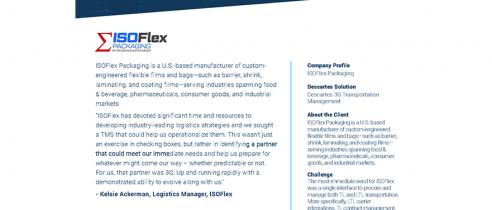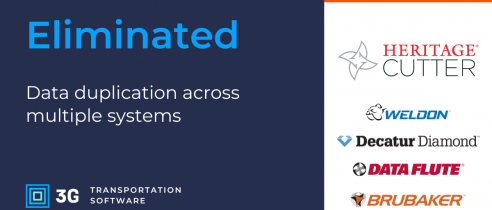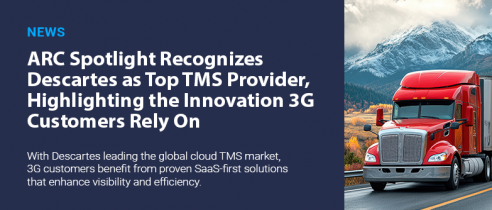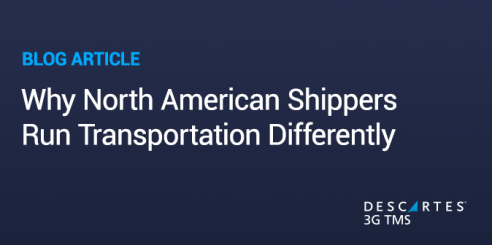Blog
Is Cloud Based TMS Software Right For Your Transport Logistics?

Transportation management systems (TMS) software has been around for decades. Most companies have been using the same system for quite some time, but they may be finding that their software no longer meets their needs.
Today, many legacy TMS systems simply can’t keep up with the demands of modern customer delivery service demands, and they’re often not easy to update. While once there was a bias toward the control and security of onsite or on-premise TMS software, today’s cloud computing capabilities have reshaped the industry.
With that in mind, is cloud-based TMS right for your transport logistics? Many companies claim to offer fully-featured cloud-based TMS software but their functionality and the transportation modes that they manage, varies greatly. If you shop around, you’ll find the differences are wide-ranging and significant.
Transportation management software plays an important role in helping companies to streamline all the various processes of your supply chain. But is it the right software for your specific industry, product offering, and distribution strategy? What is transportation management software anyway? Read on to see if TMS software is right for your transport logistics.
Here are five key takeaways from this post:
-
Cloud-based TMS is Revolutionizing the Industry
Legacy on-premise transportation management systems (TMS) struggle to meet modern logistics demands, while cloud-based TMS offers real-time visibility, cost efficiency, and ease of maintenance. -
Key Differences Between On-Premise and Cloud TMS
On-premise TMS provides more control and security but requires in-house IT management. In contrast, cloud-based TMS eliminates maintenance costs, enhances security, and ensures automatic updates. -
Cost, Security, and Visibility Benefits of Cloud TMS
Cloud TMS reduces upfront costs, provides automated security updates, and offers real-time shipment tracking and analytics, leading to better decision-making and operational efficiency. -
Scalability and Integration Are Crucial for Selection
A cloud-based TMS allows businesses of all sizes to scale efficiently but must integrate well with legacy systems. Middleware solutions, like 3GTMS’s Integration Hub, can help overcome integration challenges. -
Best Practices for Choosing a TMS
Businesses should set clear priorities, involve stakeholders, check vendor scalability, review integration capabilities, and ensure user-friendliness before selecting a cloud-based TMS.
What is a Transportation Management System?
Transportation management software systems, either installed as on-premise or cloud-based, streamline the shipping process. They may include some or all of the following areas of functionality:
- Carrier management
- Freight rating and shopping
- Load building
- Route planning and optimization
- Freight tracking
- Reporting
- Procurement
- Freight billing
- Freight audit
- Order and supply chain visibility
This transportation planning-to-execution functionality makes a transportation management system beneficial for any freight business. But choosing a TMS isn’t easy. There are two types of systems: a hosted TMS system or a SaaS transportation management system. SaaS is also known as Software-as-a-service or cloud-based software.
SaaS TMS vs Hosted TMS Systems
Any system that can offer efficiency will automatically win out over other solutions. All-in-one solutions, such as TMS systems with integration optimization planning and execution capabilities on the same platform, are much easier and faster to operate. They’re integrated into every part of the business, making efficiency much more reachable.
But businesses are becoming more automated and mobile. Many even operate their entire business on their phones. for you, or would you be better served by am on-premise TMS?
On-Premise TMS Software
Your business keeps a transportation management system on-site, within your hardware servers. There are several benefits to this:
- A high degree of control over resources and functions
- Stronger security and a choice over security options
- Designed to work with your existing ERP platforms
Maintenance, upkeep, and improvement of the system are managed in-house, providing users with a higher degree of control over the costs and frequency of these costs.
Having control over a system is often seen as a benefit, but when it comes to optimizing your business with TMS technology, this ideology can become hard to manage and costly. It requires your internal IT resources to continually update your software with pertinent industry capabilities, which can increase internal costs and cause delays in enhancements due to the IT team’s long list of systems to be maintained. In contrast, companies who choose a Saas-based TMS system are able to take advantages of all the latest updates provided by their vendor.
Also, you’ll need to keep up with proper security measures. Without them, you’re at greater risk for data breaches and high security threats. This could mean a delay or shut down in operations, which could take months to fix and years to recuperate from. Even with data backups, you’re looking at potential losses.
Cloud TMS
Cloud-based transportation management systems are essentially TMS software that is installed on a remote server – either privately owned or hosted. Cloud computing itself relies on sharing data storage, computing, and security. This allows companies to receive the benefits of TMS software without some of the costs. The software company handles maintenance, security, and updates.
There are several benefits to software as a service, particularly for TMS. Centralization is probably the greatest benefit.
Centralization of Data
Earlier we discussed the tasks that TMS software can streamline. Originally these tasks were manual, by one person or a small team. The automation and centralization of your data improves its efficiency. It also grants you greater visibility and reduces costs to nearly all parts of your business.
Reduced Costs
In cloud-based TMS, you are not paying for licensing and the costs of entry are relatively low. The rise of subscription payment models has also led to versatility. You can choose your payment frequency and the kind of functionality you receive. This means you’re able to spend based on your needs.
Also, you do not have to pay for the upkeep and storage of servers. Nor are you responsible for the maintenance and security of keeping your own TMS.
Security
Security is a major issue for any business. But is especially vital for cargo carrier companies. A single shipment contains enough details to derail your entire business. With a SaaS transportation management system, the software company conducts continuous penetration testing. is conducted, updates are automatic and maintenance is immediate. These are top priorities for any transportation software company.
Greater Visibility
Today, many companies who are still using legacy systems find that they’re lacking real-time visibility. With a modern TMS, you should be getting real-time data, reports, and analytics. You should be able to see exactly where every shipment is at every stage in the process. The analytics gathered by such systems can help you make informed decisions about your business and operate more efficiently. This is a major benefit that reduces the time spent on reports and helps you make faster decisions.
Maintenance & Equipment
With a cloud-based TMS, businesses no longer have to upkeep massive servers. They no longer have to do continual data backups, and power outages or crashes will not result in lost data. Updates and upgrades are handled remotely, ensuring that you always have access to the latest software version available. In addition, because your data is on the cloud, you may have unlimited storage potential. You can then access this data from your office or remotely, depending on your system’s permissions. This allows for greater flexibility and connectivity, and the ability to support your customers more efficiently, even if you’re offsite.
Integration
Any TMS system, whether on-premise or cloud-based, will likely be integrated with a combination of other cloud-based and/or legacy systems. Cloud transportation management systems may also have trouble integrating with legacy systems due to differences in data definitions and other conflicts. When choosing a cloud-based TMS, it’s important to keep this in mind. 3GTMS has solved this problem by implementing an Integration Hub, which is like a middleware layer between their core software and your system. This allows for easier integration with your specific software setup.
Scalability
Cloud-based TMS solutions allow you to scale your business. They also offer smaller businesses the same logistics support as larger companies. This levels the competitive playing field – at least on the logistics side.
Selecting a Cloud-based TMS
Transportation software has revolutionized transport logistics and supply chain management. streamlining processes and reducing time and costs spent on the administration. Thus, allowing you to focus on customers, and on the future of your business.
There are some caveats when selecting TMS software. Before selecting a TMS provider you should:
- Establish priorities and goals
- Get stakeholders on board with the decision
- Look for a vendor that can grow with you
- Find a TMS platform that can be easily understood and used by multiple people in the company
- Learn how long the implementation will take
- Read reviews of the TMS system and provider
- Make sure the system can integrate with legacy systems (ERP integrations)
- Check their carrier network and their process for onboarding carriers
- Get a demo
3Gtms provides cloud-based solutions to optimize transportation and execution processes and support efficient supply chain management. We serve 3PLs, carriers, freight brokers, shippers, and freight forwarders. We’ll help with planning and optimization to tracking, carrier management, integration, billing, and more. We accelerate your competitive advantage.







